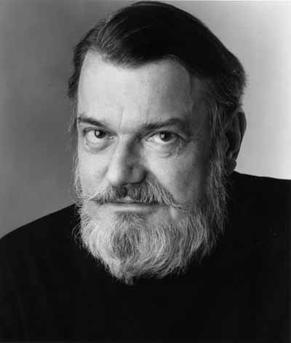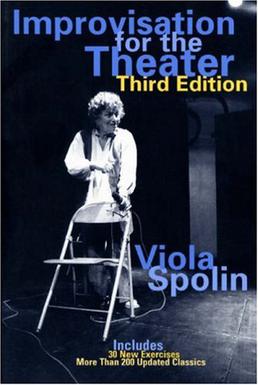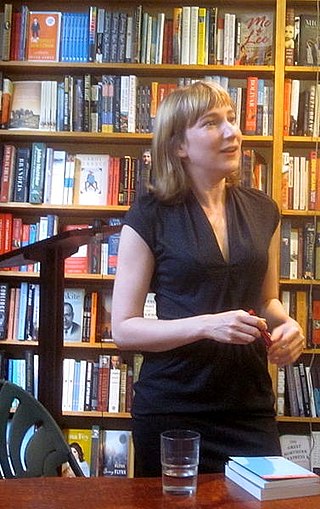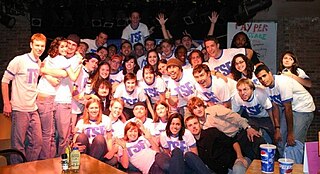Related Research Articles

Improvisational theatre, often called improvisation or improv, is the form of theatre, often comedy, in which most or all of what is performed is unplanned or unscripted, created spontaneously by the performers. In its purest form, the dialogue, action, story, and characters are created collaboratively by the players as the improvisation unfolds in present time, without use of an already prepared, written script.
Improvisation, often shortened to improv, is the activity of making or doing something not planned beforehand, using whatever can be found. The origin of the word itself is in the Latin "improvisus", which literally means un-foreseen. Improvisation in the performing arts is a very spontaneous performance without specific or scripted preparation. The skills of improvisation can apply to many different faculties across all artistic, scientific, physical, cognitive, academic, and non-academic disciplines; see Applied improvisation.

A panel show or panel game is a radio or television game show in which a panel of celebrities participate. Celebrity panelists may compete with each other, such as on The News Quiz; facilitate play by non-celebrity contestants, such as on Match Game and Blankety Blank; or do both, such as on Wait Wait Don't Tell Me. The genre can be traced to 1938, when Information Please debuted on U.S. radio. The earliest known television panel show is Play the Game, a charades show in 1946. The modern trend of comedy panel shows can find early roots with Stop Me If You've Heard This One in 1939 and Can You Top This? in 1940. While panel shows were more popular in the past in the U.S., they are still very common in the United Kingdom.

Del Close was an American actor, writer, and teacher who coached many of the best-known comedians and comic actors of the late twentieth century. In addition to an acting career in television and film, he was one of the influences on modern improvisational theater. Close was co-founder of the ImprovOlympic (iO).

Viola Spolin was an American theatre academic, educator and acting coach. She is considered an important innovator in 20th century American theater for creating directorial techniques to help actors to be focused in the present moment and to find choices improvisationally, as if in real life. These acting exercises she later called Theater Games and formed the first body of work that enabled other directors and actors to create improvisational theater. Her book Improvisation for the Theater, which published these techniques, includes her philosophy and her teaching and coaching methods, and is considered the "bible of improvisational theater". Spolin's contributions were seminal to the improvisational theater movement in the U.S. She is considered to be the mother of Improvisational theater. Her work has influenced American theater, television and film by providing new tools and techniques that are now used by actors, directors and writers.

Donald Keith Johnstone was a British-Canadian educator and theatre director. A pioneer of improvisational theatre, he was best known for inventing the Impro System, part of which are the Theatresports. He was also an educator, playwright, actor and theatre director.

Sheila Heti is a Canadian writer.

Mary Gaitskill is an American novelist, essayist, and short story writer. Her work has appeared in The New Yorker, Harper's Magazine, Esquire, The Best American Short Stories, and The O. Henry Prize Stories. Her books include the short story collection Bad Behavior (1988) and Veronica (2005), which was nominated for both the National Book Award for Fiction and the National Book Critics Circle Award for Fiction.
iO, or iO Chicago, is an improv theater and training center in central Chicago, with a former branch in Los Angeles, called iO West and in Raleigh, North Carolina called iO South. The theater teaches and hosts performances of improvisational comedy. It was founded in 1981 by Del Close and Charna Halpern. The theater has many notable alumni, including Amy Poehler and Stephen Colbert.
Becky Johnson is a Canadian comedian, writer, actress, improviser, craftsperson and organizer.

The Un-Scripted Theater Company, was an improvisational theater company in San Francisco, California. The company performed many kinds of improv formats, such as comedy, mystery, drama, adventure, and musicals, each presented in 4 to 6 week runs each season, each with its own director, format, and vision. Un-Scripted specialized in narrative and genre-based "single-story" improvised theater.
Jason Stanley is an American philosopher who is the Jacob Urowsky Professor of Philosophy at Yale University. He is best known for his contributions to philosophy of language and epistemology, which often draw upon and influence other fields, including linguistics and cognitive science. He has written for popular audiences in The New York Times, The Guardian, The Washington Post, Rolling Stone, The New Republic, and many other publications in the United States and abroad. In his more recent work, Stanley has brought tools from philosophy of language and epistemology to bear on questions of political philosophy, for example in his 2015 book How Propaganda Works, and his 2023 book, The Politics of Language.

Theatre Strike Force is the University of Florida's premier improv and sketch comedy troupe. The group also goes by TSF. The style of improv performed by Theatre Strike Force is a combination long form and short form. They both teach and perform improvisational comedy. They have six house teams which include both forms of improv as well as a sketch team. There are four long form house teams which are cast every semester and usually have six to eight members. The TSF Short Form Team is cast every semester as well and usually has fifteen to nineteen members. TSF Sketch is the final house team and usually has twelve to sixteen members, cast each semester.
Trampoline Hall is a barroom lecture series started by Canadian author Sheila Heti in Toronto. It has been sold out consistently since 2001.

Pippa Evans is a British comedian, known for her work in character and improvisational comedy.
Margaux Williamson is a Canadian painter, filmmaker, and writer based out of Toronto. Williamson’s paintings are meant to be understood in part as "a philosophical investigation of the landscape around her, as well as dedicated rigour and formal exploration into the development and possibilities of painting as a medium". Through her work she has created a highly personal visual language which she uses to explore themes of subjecthood, storytelling, life, death, aging and tension. Although dealing with dark and heavy themes, Williamson's works are ultimately hopeful, exploring the possibility of light in darkness. Williamson's works are often intertextual with her references ranging from popular culture to objects she finds lying around her studio. In her work she is unafraid to reference and draw on art history, specifically finding inspiration from artists such as "Goya, Manet, Duchamp, Luc Tuymans and Philip Guston over the years".

Jordan Tannahill is a Canadian author, playwright, filmmaker, and theatre director.

The Improv is an improvisational comedy show which was started in May 2012 in Bangalore, India. The show has no script and is totally improvised, as its name suggests. The audiences give suggestions, situations and scenarios to the host and taking the cue, the actors create on-the-spot hilarious scenes on stage. It is hosted and directed by Saad Khan, an Indian filmmaker. The show is conceptualized by Saad Khan. The show's performers are Sal Yusuf, Darius Sunawala, Abel Mathews and Tim Schultz. The team has performed over 100 shows in Bangalore, Hyderabad, Mumbai, Chennai, Dubai, Abu Dhabi and Sweden.

Pure Colour is a novel by Canadian author Sheila Heti. Published by Knopf Canada, the book won the 2022 Governor General's Literary Award for English-language fiction.
Hyprov: Improv Under Hypnosis is a comedy show that is a fusion of stage hypnosis and improvisation. It was created by hypnotist Asad Mecci, improvisational comedian Colin Mochrie, and Mochrie's manager Jeff Andrews.
References
- ↑ Penny, Laura. "The Chairs Are Where the People Go, by Misha Glouberman and Sheila Heti". The Globe and Mail. No. 5 August, 2011. Retrieved 9 November 2024.
- ↑ "The Chairs Are Where the People Go". The New Yorker. August 1, 2011. Retrieved 30 October 2024.
- ↑ Haglund, David (July 5, 2012). "Her Ideal Self". New York Times. Retrieved 9 November 2024.
- ↑ "The Chairs are Where the People Go". The New Yorker. August 1, 2011. Retrieved 30 October 2024.
- ↑ Salter Reynolds, Susan (March 17, 2014). "Discoveries: 'The Chairs Are Where the People Go' by Misha Glouberman with Sheila Heti". Los Angeles Times. Retrieved 3 November 2024.
- ↑ McCallum, David (Spring 2009). "he'll make you scream: misha glouberman". Musıcworks (#103): 10.
- ↑ "Terrible Noises for Beautiful People, performance". soex.org. 7 May 2013. Retrieved 6 November 2024.
- 1 2 Heti, Sheila (June 28, 2011). "Sheila Heti and Misha Glouberman". Book Forum. Retrieved 4 November 2024.
- ↑ Penny, Laura (5 August 2011). "The Chairs Are Where the People Go, by Misha Glouberman and Sheila Heti" . Retrieved 9 November 2024.
- ↑ Loudis, Jessica (May 5, 2014). "Should I Go to Grad School?: An Interview with Sheila Heti". The New Yorker. Vol. The New Yorker. Retrieved 30 October 2024.
- ↑ Glouberman, Misha (September 11, 2011). "BONUS FEATURE: How to Ask a Proper Question at a Public Event". The New York Times. Retrieved 4 November 2024.
- ↑ Jutras, Lisan (February 15, 2013). "Misha Glouberman's lesson: It's better to negotiate than fulminate". The Globe and Mail. Retrieved 6 November 2024.
- ↑ McCallum, David (Spring 2009). "he'll make you scream: misha glouberman". Music Works (#103): 10.